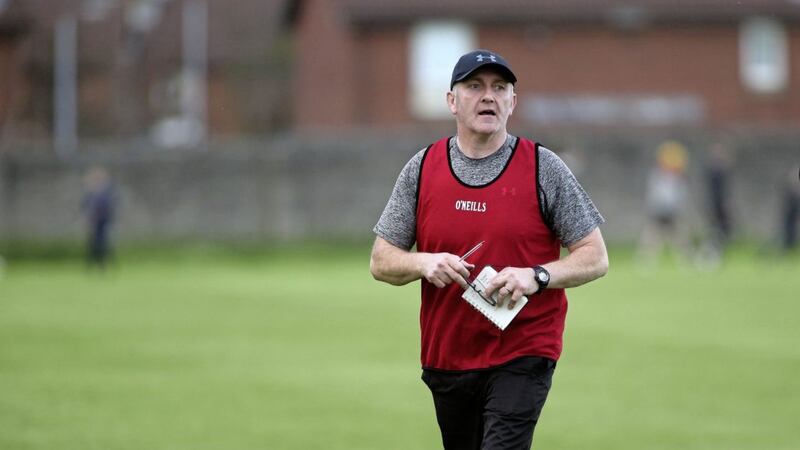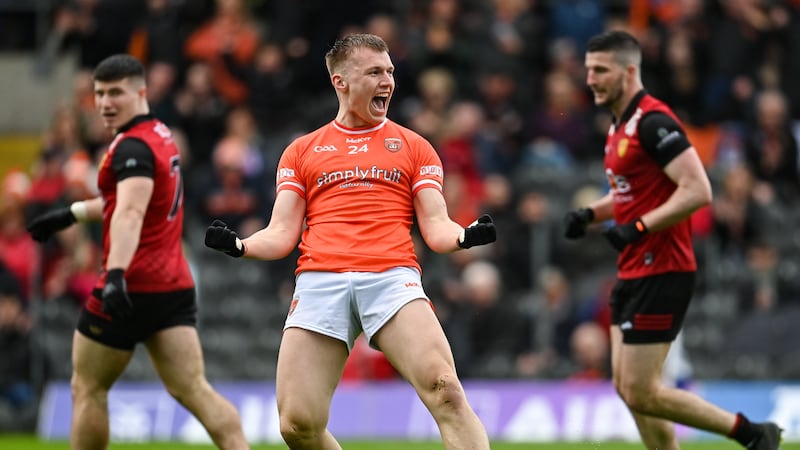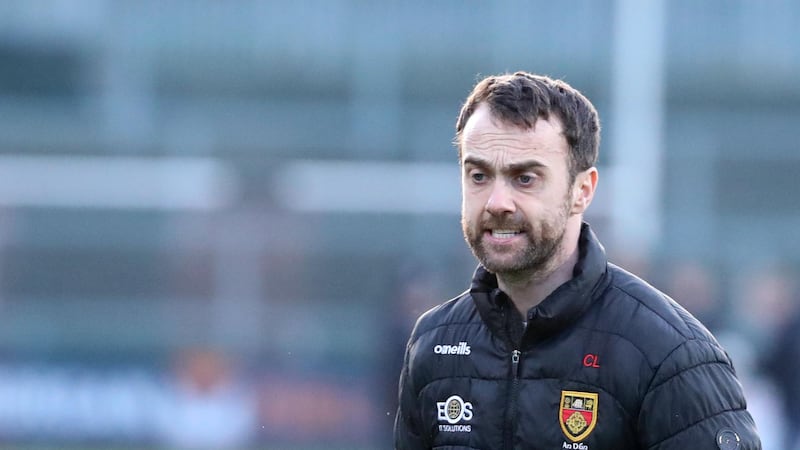DISTRICT teams of junior and intermediate players in senior championship, GPOs in every club and one-touch games for kids under 11 are the headline proposals of a radical new coaching strategy for Derry GAA.
The Oak Leaf county board earlier this year appointed an eight-man committee to review the coaching and development structures within the county.
Headed by 1993 All-Ireland winner Damian Cassidy, it included Bobby Farren (Coaching and Games Officer), Chris Collins (Games Development Manager), Philip Kerr, Sean McGoldrick, Danny Quinn, Chris McNicholl and Brian O’Donnell.
The committee looked at all aspects of coaching from club to inter-county squads and has presented a 16-page document laden with proposals that are intended to widen the base of quality in Derry.
Coming 22 years after the county last won the Ulster SFC, the emphasis of the new strategy is primarily on creating greater depth among clubs who are traditionally at junior and intermediate level.
Providing those players with an opportunity to play in senior championship for one of the four newly-established district teams is a proposal taken straight from the Kerry playbook.
The Kingdom has eight senior clubs and eight divisional teams in its senior club championship. Derry are planning to retain 16 senior clubs and add four district teams – loosely one from the city, one from south Derry towards the loughshore, and two from the central part of the county.
“It’s to create a pathway for players who are playing at a level that doesn’t allow them to develop their game sufficiently to eventually represent the county,” says Cassidy.
“The whole idea is to provide players from those clubs the opportunity to play at senior level for a three-month period of the year, where between the coaching and matches in the senior championship and the standalone district championship, complements the football and coaching at their own club.
“Ultimately we want to provide that opportunity for players at junior and intermediate to have a year-on-year opportunity to play at that level.
“If you’re coming in at 18 or 19, we hope that four or five years of being exposed to that, we’re potentially looking at a player who can be introduced into county football.
“Ultimately the bottom line is, more importantly, they’re going back into their own club as better players, which in turn will improve the quality of football in the club, in the junior and intermediate league, and invariably will drive standards over a period of time.
“It’s not something that will happen in 12 or 24 months, it’s a long-term strategy. We’re hoping we can get everything bedding in over five years maximum, where in the longer term we’ll see the spinoffs.”
The plans also include introducing the district teams at U17 (minor) level, with a long-term view to progressing them into lower age groups if it proves beneficial.
The strategy also recommends the introduction of U18.5 and U20 competitions, the former of which would be critical to bridging the gap between U17 and senior for bigger clubs especially.
The proposals will all tie in with a recently-published plan to develop GAA in Derry city through a programme that was all set to receive central funding from Croke Park before Covid struck.
The idea of each club having its own Games Promotion Officer, who would be responsible for overseeing coaching and upskilling coaches within the club, is taken directly from the hugely successful Dublin model.
Cassidy says that the county board is “confident” that the funding streams are already in existence and that coaching grants will need to be directed, with the clubs themselves funding 50 per cent of the wages.
A steering group involving members of the club and the county’s Games Development Manager will be responsible for laying out the responsibilities of their GPO, which can be divided as the club sees fit across football, hurling and camogie.
“That steering group will be responsible for recruiting. There’s an audit to be carried out by the GPO to identify the areas that have to be developed within the club.
“That role then is to sit and produce a 12-month plan with KPIs, for that to be monitored and held to account by the steering group.”
Some clubs are expected to have their own GPO initially, while other clubs will be more likely to explore sharing a coach, whose time would be apportioned based on what percentage each club is funding.
Among the most interesting proposals is the idea of ‘silent sidelines’ for underage games below U13 level.
That would ban all forms of outward communication from anyone other than the players. Led by Philip Kerr, whose “reservoir of coaching knowledge” was a particular asset to the weekly Zoom group meetings which he joined from Australia, the idea is intended to promote improved communication skills among players.
“There’s very strong evidence from other sports. What we want to do is create players who are autonomous, who can think for themselves, who can problem-solve, who can correct during the course of a game things that aren’t working out,” said Cassidy.
“You’ll coach the cubs during the week and then we see during the matches, both the coach and the parent telling wee Jonny to get the ball, kick the ball, where to run to, when not to run, and wee Jonny is confused as hell.
“There’s very strong evidence that if you have the silent sideline, it allows the player to figure it out for themselves. It allows flair to be developed, it allows the individual skills to be developed, it allows players to communicate more with each other.”
Games for U11 players will be one-touch, with two-touch at U13, while the Go Games season is proposed for an extension by eight weeks into early November to create the most room for alternate weeks at football and hurling.
All players will also be guaranteed at least 50 per cent of game time in every game.
“Look at the typical model where you have young lads going on for five minutes at the end of the game. Sometimes he doesn’t get a run out at all,” says Cassidy.
“That cub’s gone, he’s lost to you. If there’s 50 per cent participation until that age group, chances are he’ll stay with you and he may become a decent player.
“There’s no hard and fast rule around when players develop. I’ve seen good players in our own club who made significant contributions, and their development occurred mostly at 17, 18, 19.
“If they’re not getting that exposure 50 per cent of the time, those lads will be gone, and gone forever.”








